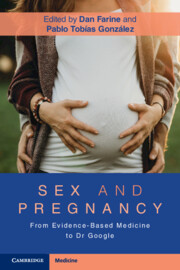Book contents
- Sex and Pregnancy
- Sex and Pregnancy
- Copyright page
- Dedication
- Contents
- Contributors
- Preface
- Section 1 General Issues
- Chapter 1 From Sex for Reproduction to Reproduction without Sex
- Chapter 2 Sex in Pregnancy
- Chapter 3 Physiology of Pregnancy As Related to Sex
- Chapter 4 Does Orgasm Affect Fetal Well-Being?
- Chapter 5 Demographics of Sexual Behavior in Pregnancy
- Chapter 6 Sexual Practices during Pregnancy in Different Cultures
- Chapter 7 What Do Obstetric Guidelines Say?
- Chapter 8 Using the Internet to Educate on Sex and Pregnancy
- Section 2 Specific Issues
- Index
- References
Chapter 5 - Demographics of Sexual Behavior in Pregnancy
from Section 1 - General Issues
Published online by Cambridge University Press: 09 November 2022
- Sex and Pregnancy
- Sex and Pregnancy
- Copyright page
- Dedication
- Contents
- Contributors
- Preface
- Section 1 General Issues
- Chapter 1 From Sex for Reproduction to Reproduction without Sex
- Chapter 2 Sex in Pregnancy
- Chapter 3 Physiology of Pregnancy As Related to Sex
- Chapter 4 Does Orgasm Affect Fetal Well-Being?
- Chapter 5 Demographics of Sexual Behavior in Pregnancy
- Chapter 6 Sexual Practices during Pregnancy in Different Cultures
- Chapter 7 What Do Obstetric Guidelines Say?
- Chapter 8 Using the Internet to Educate on Sex and Pregnancy
- Section 2 Specific Issues
- Index
- References
Summary
Sexual behavior in pregnancy is affected by many factors, including biological, psychological, social, and environmental, that vary throughout its course. To assess the demographics of sexual behavior in pregnancy, several research tools have been developed. The Female Sexual Function Index (FSFI) is a brief self-report measure that is commonly used to assess female sexual function in research studies. In general, the literature has shown that sexual frequency and sexual function decline over the course of pregnancy. Most studies demonstrate a decrease in the first trimester, no change or an increase in the second trimester, and then a sharp decrease in the third trimester and early postpartum period. In order to address the decline in sexual function over the course of pregnancy, it is important to understand and recognize the factors contributing to sexual dysfunction in pregnancy. Some of these factors include discomfort, nausea, fatigue, fear of harming the fetus or causing infection, and negative self-perception. Physicians should create a supportive environment in which patients feel comfortable discussing their concerns regarding sexuality in pregnancy. Exploring and addressing patient fears may alleviate unnecessary abstinence and the associated stress this places on a relationship.
- Type
- Chapter
- Information
- Sex and PregnancyFrom Evidence-Based Medicine to Dr Google, pp. 27 - 31Publisher: Cambridge University PressPrint publication year: 2022

